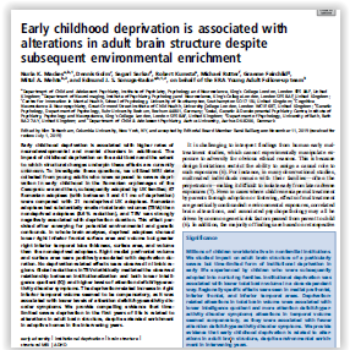Early childhood deprivation is associated with alterations in adult brain structure despite subsequent environmental enrichment
Millions of children worldwide live in nonfamilial institutions. We studied impact on adult brain structure of a particularly severe but time-limited form of institutional deprivation in early life experienced by children who were subsequently adopted into nurturing families. Institutional deprivation was associated with lower total brain volume in a dose-dependent way. Regionally specific effects were seen in medial prefrontal, inferior frontal, and inferior temporal areas. Deprivationrelated alterations in total brain volume were associated with lower intelligence quotient and more attention deficit/hyperactivity disorder symptoms; alterations in temporal volume seemed compensatory, as they were associated with fewer attention deficit/hyperactivity disorder symptoms. We provide evidence that early childhood deprivation is related to alterations in adult brain structure, despite environmental enrichment
in intervening years (resumen en el propio documento).
Autoría: Nuria K. Mackesa, Dennis Golmc, Sagari Sarkard, Robert Kumstae, Michael Rutterf, Graeme Fairchildg, Mitul A. Mehtab and Edmund J. S. Sonuga-Barkea.
Edita: Nim Tottenham, Universidad de Columbia, Nueva York.
ACCEDE AL DOCUMENTO




0 Comments